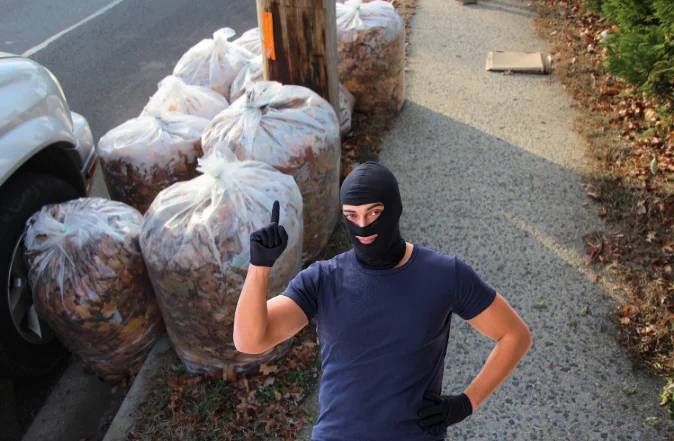I live in your typical American suburb. Every autumn, my neighbors rake up their leaves, place them in bags and put them out on the curb.
And that’s when I spring into action.
I gas up the family minivan, drive around my neighborhood and swipe them.
You see, I’m a skilled leaf thief.
In fact, I can usually fill the van two or three times in a single weekend. Of course, the theft I’m committing isn’t exactly criminal behavior, although I do experience a sort of high from it.
I wait and let all of my neighbors do the work for me, but instead of allowing those bags of nutritious yard waste go to the local dump, I snap them up for my growing compost pile.
What started as a simple exercise in mindful green living has now become a bona fide side hustle.
Every Spring I sell my homegrown high-quality compost right back to my neighbors at a considerable profit.
And my neighbors can’t get enough of it.
For me, a leaf thief was born entirely out of necessity.
My yard can only produce so much yard waste. Three years after I started composting, I couldn’t produce enough to satisfy the needs of my relatives.
I mowed my lawn, raked up the leaves, weeded the garden, but my compost always fell short.
My yard is larger than most, but a seemingly large quantity of fresh cut grass and leaves when decomposed is vastly smaller.
Then I realized that all of my neighbors were just bagging up this resource and tossing it away. As we all know, once trash is on the curb, it belongs to whoever takes it.
Not only is compost a nutrient rich soil amendment, but it’s also a great soil enhancer. It can loosen up hard clay soil, and it’ll allow sandy soil to retain more water.
Compost can be used as a replacement for fertilizers and will also improve pH balance and soil fertility.
And all of this means that you will have healthier plants and a nicer looking garden.
In order to make premium compost, I collect “browns” that are rich in carbon and “greens” that are full of nitrogen. I fill my compost bins (yes, plural) with one part “green” to about 15 to 20 parts “brown”.
More To Discover
- Exploring the Future of Christmas Tree Farming: Can Vertical Farms Be the Answer?
- Using Space as An Excuse? Why Anyone Can Compost Even in a Small Apartment or Balcony
- Don’t Know What to Do with Your Surplus Herbs from Your Herb Garden, Here’s an Idea for You!
- Seaweed Farming for Carbon Dioxide Capture Poses Ocean-Sized Challenges in Scaling Up
In autumn, fallen leaves are abundant and make some of the best “brown”.
Without adding a source of nitrogen to your leaves, you will get something called leaf mold when it decomposes.
Leaf mold is still useful as a basic mulch.
But if you want to make real compost with the full benefits, you need to add some “greens” into the mix.
The grass clippings from your lawn mower are a great source of nitrogen, as are coffee grounds.
And yes, I have been known to ask local coffee shops for their used grounds, and they’re always thrilled to help.
If you keep your compost pile moist and remember to turn it here and there, you should have usable compost by the time spring comes.
Dakoa has more information on setting up a compost bin here.
If your neighbors don’t want to take advantage of their yard waste and make compost with it, then it’s up to you to stop the cycle of waste.
Give those leaves a home in your compost bin and eventually in your garden.
Your plants will thank you. And you may even develop it into a side hustle over time.



















